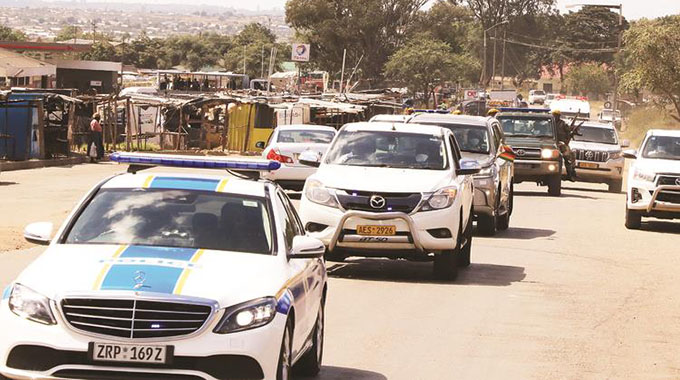Editorial Comment: President’s tour will transform into greater good

It was a good decision for President Mnangagwa to tour Harare’s high-density suburbs to establish the degree of compliance with the 21-day lockdown directive.
At the weekend, the President toured nine Harare high-density suburbs and the sprawling town of Chitungwiza, saying it was important for him to go around and see how people were coping with lockdown measures as part of the fight against coronavirus.
Leading from the front, the President and his entourage spent three hours touring Budiriro, Glen Norah, Glen View, Highfield, Kuwadzana, Mabvuku, Mufakose, New Marimba, Tafara and Chitungwiza.
It is critical that the President saw first-hand the extent of compliance, but also the general conditions that residents of these suburbs live under.
For example, in Mabvuku and Tafara, he saw residents fetching water in buckets instead of drawing water from council taps.
They have not had water from municipal taps for more than a decade, residents will vouch.
He also saw women carrying bundles of firewood — testimony to the energy challenges residents encounter on a daily basis.
Water and firewood challenges have become commonplace and embody the villagisation of urban areas as council struggles with basic service delivery to ratepayers.
He also witnessed the appalling state of the roads due to poor or total absence of maintenance.
He no longer needs someone to tell him how residents of high-density suburbs live and cope under these conditions.
One of the points raised about leaders is that most tend to live in ivory towers — far removed from the lived reality of the ordinary people.
Under such circumstances, leaders are at the mercy of their officials, who are always eager to please, often mislead intentionally or not.
So every now and then it is instructive for leaders to be with the people.
In February this year, President Paul Kagame of Rwanda fired the country’s health minister for misrepresenting Kigali’s readiness to fight the novel coronavirus and availability of Covid-19 screening kits.
President Kagame sacked Diane Gashumba, and other members of government for lying about the virus and Rwanda’s preparedness to fight the epidemic.
It is against this backdrop, that President Mnangagwa’s tour needs appreciation.
Although the tour was specifically about Covid-19 compliance, the residents of the high-density suburbs visited will hope that some good comes in the wake of the tour.
But there is a point about enforcement that arises from the current lockdown measures.
The urban areas have been cleared completely of vendors and homeless people.
The homeless have been moved to centres on the outskirts of Harare — Mount Hampden, Jamaica Inn and Ruwa Rehabilitation Centre.
Hundreds of homeless males have been moved to Mount Hampden, while boys living and working on the streets have been taken to Ruwa Rehabilitation Centre and females taken to Jamaica Inn, 35km from Harare.
Jamaica Inn is near Melfort in Mashonaland East Province.
In the interim, there is need to understand how it has been possible to de-congest the central business district of the ubiquitous vendors and the homeless people.
The guiding interest should be finding a long-term solution to the homeless, who have been relocated to the three sites on the outskirts of Harare.
Allowing them back after the 21-day lockdown would be tantamount to giving up on finding a lasting solution.
It is essential that authorities rope in experts on how best to deal with the issue of people who live on the streets in the country’s urban areas, not just those in Harare.
For the vendors, the lockdown period might provide an opportunity to move them to designated areas such as the space after Beatrice Infectious Diseases Hospital along Simon Mazorodze in Mbare.
Local authorities in other centres throughout the country can adopt similar measures in dealing with the problems in areas under their jurisdiction.
Again, there are precedents; there are lessons to learn from Rwanda, both about de-congesting its cities and dealing with the issues of the homeless.
So the lockdown is an opportune moment to get experts to advise on how to effect a seamless transition for the twin challenges of the proliferation of vendors and the people living on the streets from the current public health hazard issue to acceptable conditions that include skilling the homeless so they can fend for themselves and their families better.










Comments